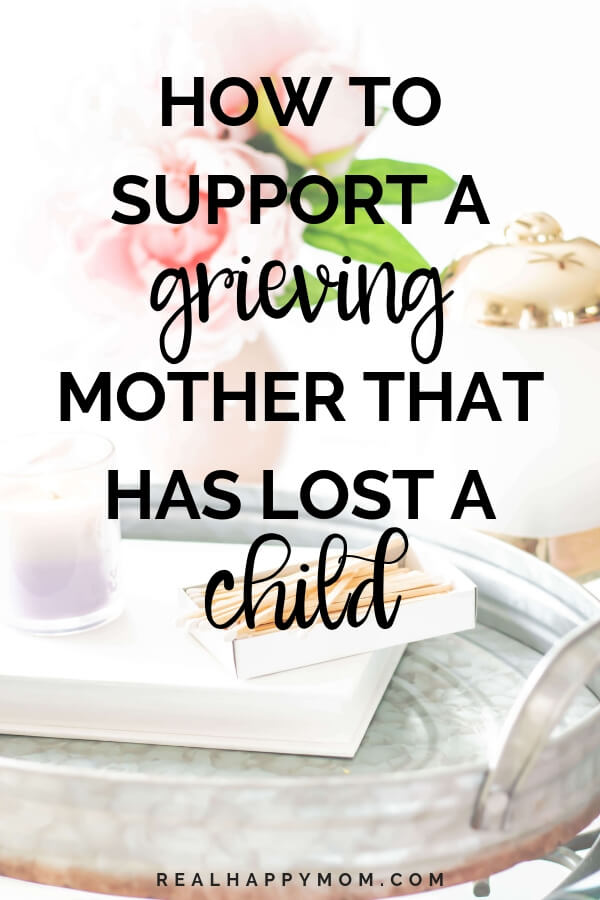Do you know a mother that has lost a child?
This is one of the most challenging things ever to deal with. A grieving mother can heal with the help of family and friends. But how can you support a mother grieving the loss of a child?
I am talking to Megan about grief and child loss in this Real Happy Mom Podcast episode. In particular, she is sharing her story and giving us tips to help support a grieving mother.

More about this grieving mother, Megan
Megan is a mother of five and lives in Minnesota. Megan has been married to her husband for eight years and stays at home to homeschool her children.
When pregnant with her fourth child and four weeks from her due date, she checked on her 15-month-old daughter, Aria, and found her unresponsive.
I found her after she had passed away in the night. And so that began my road down grief and loss and trying to figure out how to live with a child who is gone.
This led Megan down the road of grief and loss.
Grief is really a hard road and very crazy cause you don’t, they’re very foreign emotions and you don’t understand what’s going on in a lot of creative things happen to you that you don’t get.
As a result of finding her daughter after she passed away, Megan suffered from PTSD and anxiety. Then she gave birth to her daughter four weeks later.
How this grieving mother was able to recover from heartbreak
I knew as soon as Arya died that I could not do this alone, that I needed help and I needed to seek help professionally and allow the people in my life to help me.
One thing that I know is we are a lot stronger than we think we are.
Even at Megan’s weakest moment, she shows incredible strength. She knew that she needed help and accepted the help of others.
Help from others is not just babysitting and casseroles but also professional help from a therapist.
Through her first therapist, Megan found out that she had PTSD. She was then referred to another therapist to treat her PTSD using EMDR therapy.
EMDR is Eye Movement and Desensitization Reprocessing. EMDR is a proven psychotherapy that helps individuals that suffer from trauma.
It’s a therapy that helps basically bring down the symptoms of PTSD from a really high, high level to where I am now today, which is about like maybe a two or three. I still live with the trauma, but it’s definitely on a livable scale. I can manage day to day with it.

Megan had supportive friends and family members that allowed her to process all the emotions that come with grief and deal with it head-on.
I guess grief brings on so much crazy, crazy emotions and you feel really alone because you don’t know what’s going on with you. You can feel so many things that make you feel guilty or angry and you have no idea but like why or what’s happening or you’re going crazy.
Through therapy and talking with other grieving moms, Megan learned that she was not alone and her feelings were normal.
All of those emotions are completely normal when dealing with grief.
It’s a hard, it never fully leaves. It will always be with me … I don’t want the grief to go away really because it is a reminder to me of my love for Aria and that I will never forget her.

How this grieving mother supported her children through grief
Megan’s children were four and two when Aria passed away.
Unfortunately, they saw Aria die, and it was traumatic as anyone could imagine. As a result, the kids went through therapy as well.
There’s a thing called play therapy. So they just play with their therapist. And the therapist watches their behaviors and what comes up. And just kind of doesn’t really interfere a ton, but she watches and sees what’s going on because that’s how kids get out their trauma and grief is through play.
Megan’s kids were young at the time of Aria’s death.
Although they were young and experienced trauma from their sister’s passing, Megan found they are resilient and bounced back rather quickly.
They would be like, oh yeah, Aria died and then they move on. Like the way they talk was like, it’s very hard sometimes as a parent to hear, but in the other way it’s, it’s a blessing that they don’t feel that extent of grief and pain that we do.
Although their grief is not as extensive as Megan’s, that is not to say that they don’t feel pain and grief. Or that they don’t suffer from trauma.
Megan mentioned that she notices that her older son that he has moments of fear when kids are sleeping.
The key that Megan has found is allowing her kids to process their feelings and then having an open conversation with them when they are ready.
We are open to talking about it. Talking about her and talking about what happened. And I think the hardest thing we can do for them is to ignore it and to tell them to get over it or not want to talk about it.
Megan mentions that kids at this age take on the burden and blame themselves even though they have nothing to do with what happened.
This is why it is so important to have open conversations to help your kids understand that it is not their fault and that they did nothing wrong.
But that sometimes that happens and we don’t know why or understand why, but to work through the emotions of that.

How this grieving mother was able to find hope
Megan mentions three things that she needed to help her find hope.
- Friends
- Family
- Faith
With their support, she could work through her emotions and not feel scared to experience pain.
It is okay to feel all the emotions that come with grief. You will feel emotions that don’t make sense and may even scare you.
When dealing with grief and loss, ensuring you don’t do this alone is essential.
I think just being validated and all those emotions and thoughts and knowing that you’re not alone is super helpful and so facing all those emotions, I feel like now my waves of grief where when they were so close together and hit so hard, now they’re further apart and when they come, I know that I can get up again.
Ignoring how you feel doesn’t make the grief go away faster. No set time has to go by before the waves of grief are not so close together. Everyone grieves differently.
Although you will probably experience grief for the rest of your life, it is still possible to have joy.
I know that it’s possible to have joy amidst the grief. It doesn’t mean the grief goes away, but that they can live together in the same life and I can still have a beautiful life.
One of the favorite things that Megan shared was this:
I know we all want to just be happy and only have good things, but those painful and hard moments are also beautiful in a way and when we can be raw and beautiful and vulnerable with ourselves and with other people, it creates such deeper connections.

How do you comfort a grieving mother?
The biggest thing that Megan mentioned more than once is to understand that you can not fix or change someone who is going through grief.
There is no fixing what happened.
As much as you would love to change the person’s situation or how they feel, you can’t.
Listen
So what can you do? Listen.
Listen to what they have to say without judgment.
Make sure to listen to their feelings and allow them to express themselves. Then validate them, speak back about what they are saying, and tell them it is hard.
Sometimes you have to talk about your story thousands of times. It might be many, many times that and other people might think, seriously, can you just like get over it? And you know what? It is hard. You can’t, you don’t just get over it.
Allow them to feel
Understand that many feelings come up, like anger, confusion, depression, panic, anxiety, rage, hate, blame, and guilt.
Understand that these feelings can be scary for you and the griever. Know that these feelings are entirely normal.
Avoid telling the griever that they shouldn’t feel those feelings. Instead, allow them to process these feelings and discuss them without judgment.
So just being present and allowing them to express their emotions, checking in on them.
You can even offer to come and sit with the person grieving. Make sure to communicate and see if this will help them.
The best advice that Megan gave is if you don’t know what to say or do, try saying this:
I don’t know what to say because I don’t want to say the wrong thing. And I know you’re in a lot of pain and I just want to be here for you. I care for you. Can I just sit with you?

What should you not say to a grieving mother?
After asking Megan what things to avoid saying to a grieving mother, she was very clear that everyone is different.
What is offensive to one person may not bother another person.
Megan gave me a few things I wanted to share with you so that you can support a grieving mother.
Let me know
Avoid saying, “if there is anything I can do, let me know.”
As a grieving mom, your brain is so in a fog and fried that you can’t even think of what do you need. It’s hard to even come up with something. If you can think of something that you yourself can give freely.
When Megan mentioned giving freely, you could tell she was reminded of a particular circumstance where someone was not giving freely.
Instead, the person supporting didn’t honestly want to help, and it was noticed.
It’s really difficult to take something from somebody that they’re not giving freely. Like when you’re on the receiving end of help, it’s already hard enough to be getting so much help. And then when somebody, you can tell that they don’t really want to help, it’s hard.
So give from your heart. And give freely. This shows you support a grieving mother.
Megan even suggests coming up with a few ideas of how you can help that work with your time and budget to support the griever.
For instance, you can suggest bringing dinner on Tuesday or babysitting the kids on Friday after work for a few hours.
Then say let me know which one works best for you.

At least
Also, avoid saying, at least. For example, “at least you got to have four years with your son before he died.”
This is not a good thing to say. And not something a griever wants to hear.
Too spiritual
For my spiritual friends, avoid saying, “God knows what is best.” Or “God needed her more than you.”
And I think as a mom it’s really hard to hear that because you feel like there’s no better place than for your child to be with you. And it doesn’t mean that you don’t believe that at some point, eventually maybe you can come to terms or believe that again. But all those things that are meant to be supportive, they don’t really help in that moment of really dark despair.
Don’t disappear
When someone is grieving, it can be scary. And your instinct may be to avoid the individual. But don’t do that.
And I think that’s one of the worst things you can do is do nothing. Because when you’re in this really, really dark place in the moment that you need the support and friends the most than people tend to run away because they’re too scared and nervous and they don’t know how to deal with grief and their feel awkward and this person, this mother who has lost her child needs that support the most right now. Don’t be afraid to do the wrong thing.

Megan reminds us that we all make mistakes. So don’t fear saying the wrong thing to the grieving person.
Don’t disappear. Your love and support are needed now more than ever.
All of us will grieve in some way. Not all of us will lose our child or children, but all of us will have grief in our life and so if we can learn about it and know how to face it and it’s an important topic.

To learn about Megan and to deal with the loss of a child, visit her website. Or in her Facebook group for grieving moms. You can also find Megan on Instagram and Facebook.

Subscribe & Review on Apple Podcast
Have you subscribed to the Real Happy Mom podcast? If not, I’m encouraging you to do it today.
I don’t want you to miss any upcoming episodes. I plan to add some bonus episodes that you won’t find on this website, and if you’re not subscribed, you might miss out on those. Click here to subscribe to Apple Podcast!
I would be so happy and grateful if you left me a review on iTunes too. Reviews help iTunes to know that this is a podcast for other moms so that other moms can find this podcast. Plus, it makes my day to read the reviews.
Just click here to review, select “Ratings and Reviews” and “Write a Review,” and let me know your favorite part of the podcast. Many thanks for considering my request.
Don’t have iTunes? You can subscribe to the podcast Google Podcast, Anchor, Spotify, Breaker, Castbox, Overcast, RadioPublic, and Stitcher.